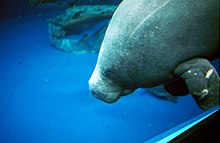West African manatee
| African manatee | |
|---|---|
 |
|
| Scientific classification | |
| Kingdom: | Animalia |
| Phylum: | Chordata |
| Class: | Mammalia |
| Order: | Sirenia |
| Family: | Trichechidae |
| Genus: | Trichechus |
| Species: | T. senegalensis |
| Binomial name | |
|
Trichechus senegalensis Link, 1795 |
|
 |
|
| African manatee range | |
The African manatee (Trichechus senegalensis), also known as the West African manatee or seacow, is a species of manatee which is mostly herbivorous. African manatees can be found in much of the western region of Africa, from Senegal to Angola. Although scientists do not know a lot about this species, they hypothesize the African manatee is very similar to the West Indian manatee (Trichechus manatus).
The African manatee was officially declared a species under the Trichechus senegalensis taxon in 1795 by the naturalist Johann Heinrich Friedrich Link. No subspecies of this taxon are known and no genetic evidence supports the idea that there is a significant difference between coastal manatee populations and isolated inland populations. The African manatee falls under the genusTrichechus with only two other species, the Amazonian manatee and the West Indian manatee, which are also sirenians.
African manatees can be found in the west African regions of Angola, Benin, Cameroon, Chad, the Republic of the Congo, the Democratic Republic of the Congo, Côte d'Ivoire, Equatorial Guinea, Gabon, The Gambia, Ghana, Guinea, Guinea-Bissau, Liberia, Mali, Mauritania, Niger, Nigeria, Senegal, Sierra Leone and Togo. Manatees are found in bodies of water ranging from brackish to freshwater, including oceans, rivers, lakes, coastal estuaries, reservoirs, lagoons, and calm shallow bays on the coast. It is very rare to find an African manatee in water with a temperature below 18°C (64°F).
...
Wikipedia

